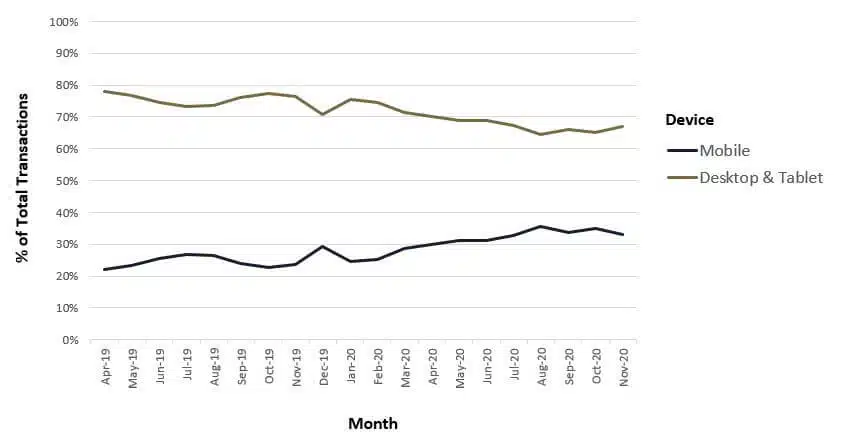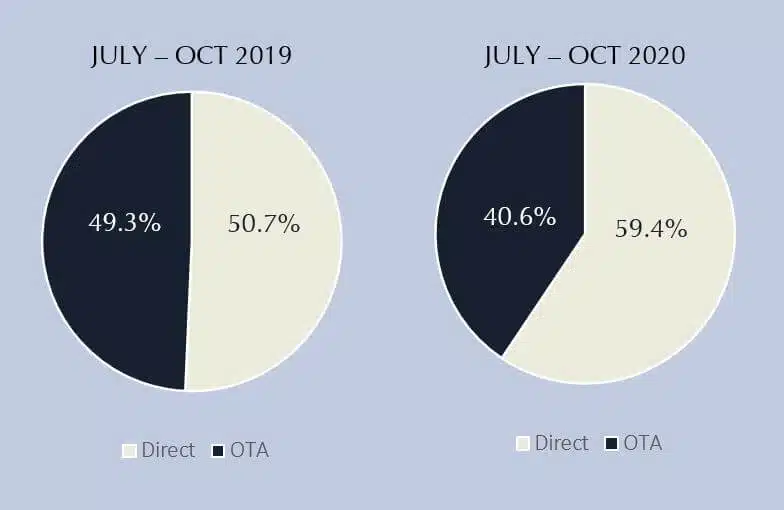This is a guest post by David Gardner, Managing Director of 80 Days, a digital marketing and creative services agency for hospitality and travel.
How do you begin to plan for the unplannable? If there is one thing 2020 has taught us with absolute certainty…it’s that there is no absolute certainty.
In a rapidly changing marketplace, agility is key. You must plan for multiple scenarios –positive and negative. Not being in a position to capitalise upon a market upturn can be as harmful to your business as not being prepared to react to new restrictions.
You must maintain active communication and engagement with guests, even while closed, to ensure a stronger bounce back. Early on in the pandemic, 80 DAYS conducted a study that suggested those who continued to engage their customers experienced a significantly smaller decrease in traffic than those who switched off their marketing activity altogether.
Now, with vaccine programmes on the horizon, how can you prepare for the returning demand for travel? Here are some key trends to be aware of in 2021.
Positioning
How you position your brand in the coming months will play a critical part in determining how quickly you recover, as this is what will stick most in the minds of your customers for years to come. In any crisis consumers turn their attention towards the brands that they’re most loyal to, to decide whether they’re worthy of support.
Know who you are. Know who your customers are. Don’t try to be all things to all people.
Safety is an essential requirement, but it is not your product
A recent 80 DAYS survey suggested that 96% of travellers rate cleanliness and hygiene measures as important or vital when booking a trip. However, while you must convey guest safety measures, don’t make this your sole message.
Inspire and inform
According to our research, 70% of travellers want inspiration from an accommodation website. However, 60% of the content on most websites focuses only on general information, such as check-in and check-out procedures, available amenities, cleaning protocols, etc. It’s imperative you strike the right balance of inspiring travellers, while giving them the necessary information they require to make a booking.
Mobile usage is accelerating

A clear trend can be observed from the graph above – mobile activity accounts for an increasingly larger percentage of accommodation bookings since March 2020. Our data shows mobile traffic has increased by 17%, while mobile revenue is up 47%.
Now is the time to review your website and booking process on mobile.
Staycation is the buzzword, but not the keyword
2020 (and 2021) may well be the ‘year(s) of the staycation’. However, while the domestic travel market should absolutely be your short-term focus, take care in what keywords you target with both Search Engine Optimisation and paid advertising.
While there has certainly been an increase in staycation searches, the overwhelming majority still search by location/destination. For example, terms like ‘holidays in Rome, ‘French city breaks, ‘accommodation in Dubai’ et al.
Direct booking
A recent study into the online travel booking distribution unearthed an apparent shift in the purchasing behaviour of guests during 2020.

OTAs retrenched during the pandemic, ceasing to bid on brands in paid advertising. Now OTAs account for, on average, 41% of bookings with direct website bookings accounting for the remaining 59%, representing an increase of 17% YoY.
The challenge for 2021 will be in both maintaining and growing this change in guest booking behaviour. Budgetary investment in digital marketing and online advertising may help to redress the balance more permanently while significantly reducing distribution costs. In addition, it would be advisable to review any ‘Book Direct’ benefits you offer to ensure they feature prominently on your website and marketing messaging
Audience Targeting
More than ever, it will be crucial to focus on how you target key audiences. Use all the tools at your disposal; Google Analytics, Google Ad targeting, Facebook demographic targeting et al to capitalise on both domestic travellers and the re-opening of international travel. Create pre-defined audiences for individual countries so that as air corridors open up, you’re able to quickly capture any sudden surges in search traffic. This approach should help you allocate your online advertising budgets more effectively, driving a stronger return on investment.
In short, be ready to target the right customer on the right channel, with the right message at the right time.
To conclude
I hope that these trends help you to look at the future of travel with renewed optimism. With our survey into guest intent suggesting that 96% of guests want to travel in 2021, you should, focus on the following to be ready to welcome them.
- Plan for multiple scenarios – agility is key.
- Be crystal clear with your positioning.
- Safety is not your product.
- Inspire more than inform.
- Optimise your mobile experience.
- Target by search behaviour.
- Destinations sell.
- Take advantage of the shift to direct booking.
For more information on managing your short-term rental business in the new year, visit Guesty’s Coronavirus Infocenter.





